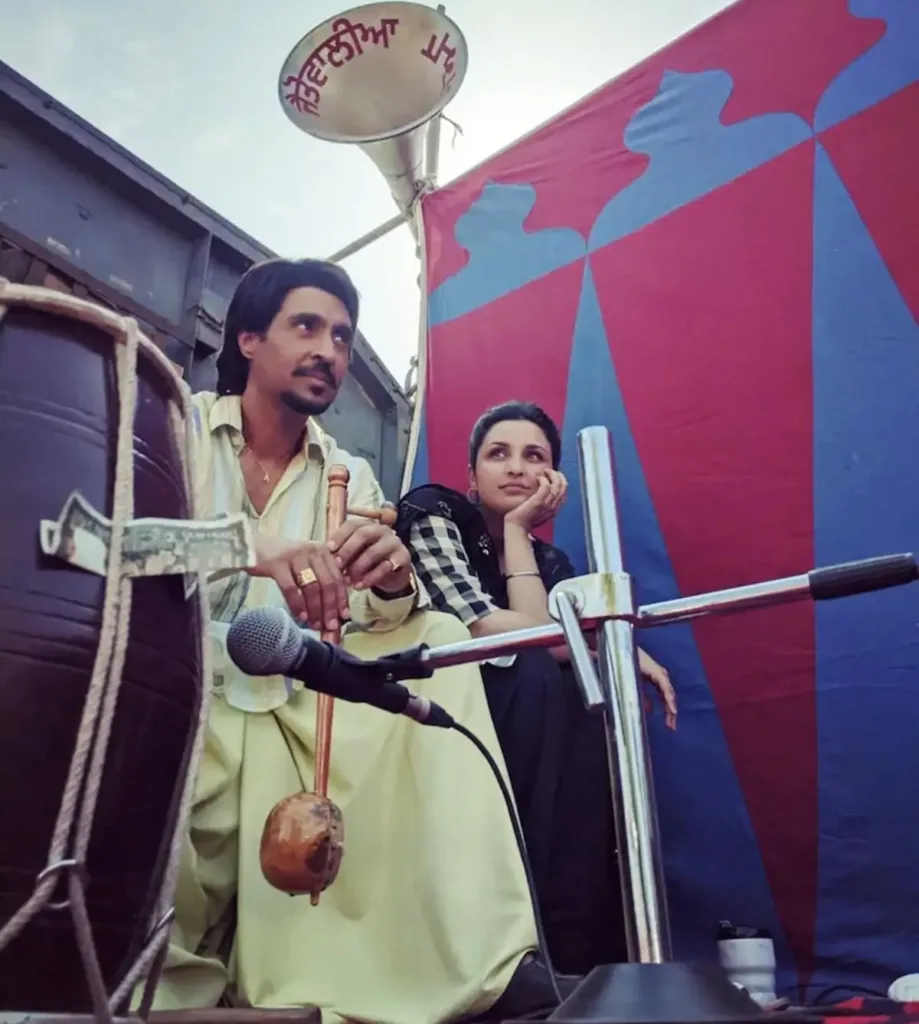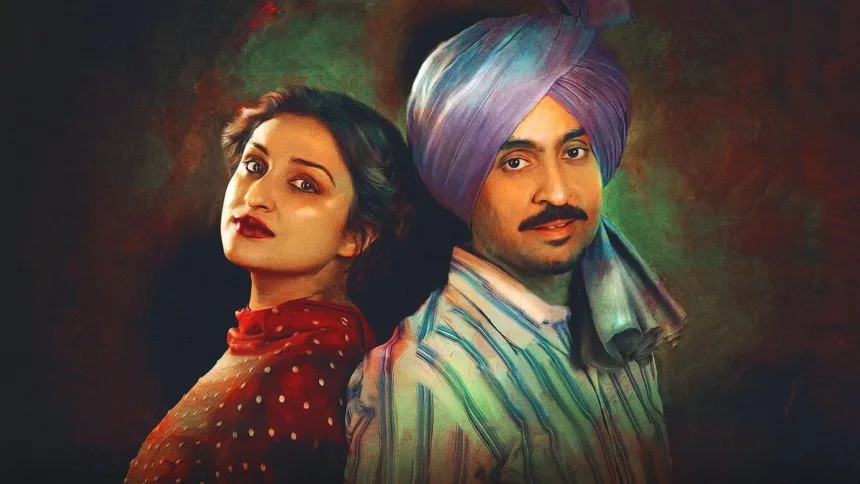A review of the film “Amar Singh Chamkila” should not be missed for the music alone, as well as Diljit Dosanjh’s portrayal of the renowned Punjabi vocalist. The film’s success may be attributed to its solid screenplay as well as the performances and soundtrack.
‘Amar Singh Chamkila’ by Imtiaz Ali starts at the very end. from the moment everything seems to be finished. In the film, Diljit Dosanjh portrays Chamkila, a mysterious Punjabi folk musician whose promising career is cut short by his senseless death.
The tone of the talk between the guy who has lost his ‘Ustaad’ and the police officer looking into his murder changes in the midst of the tragedy. The blood of Chamkila and his wife Amarjot Kaur stains the Punjabi music business, making them a miserable sight draped in white sheets.
The movie is a remarkable account of a guy whose courage ruined him and made him a huge star at the same time. The most remarkable thing about it is that we can nearly always witness both his ascent to fame and his impending collapse occurring simultaneously. Even in the face of threats to his life from terrorists from Khalistani province and competing musicians, Chamkila never fails to captivate audiences with his unique charisma.
“Amar Singh Chamikla” follows the structure of a biographical drama at first, but it delves deeper into the themes of evil, innocence, and a man’s need to prove his worth in the face of mounting criticism. Imtiaz Ali, the filmmaker, has moved away from his well-known post-teen love clichés, and I concur with AR Rahman, the music director, who tells The Hindu that “Imtiaz has reinvented himself” with this film.
DILJIT DOSANJH – PARINEETI CHOPRA – IMTIAZ ALI: ‘AMAR SINGH CHAMKILA’ TRAILER OUT NOW… #Netflix [@NetflixIndia] unveils the trailer of its keenly-awaited film #AmarSinghChamkila.
Directed by #ImtiazAli, it stars #DiljitDosanjh and #ParineetiChopra… Music by #ARRahman…… pic.twitter.com/BhWjDnHUyR
— taran adarsh (@taran_adarsh) March 28, 2024This film is not meant to be a documentary on Chamkila’s double-entendre songs, which led some self-described social watchdogs to label him and his fans as “ganda banda” (dirty men). However, it also serves as a critique of the era and culture that Chamkila lived in. Imtiaz has demonstrated how Chamkila’s life and career were affected by the insurgency in Punjab during the 1980s, as have script creators Nidhi Sethia and Richa Nanda.
In order to enhance the viewer’s emotional connection, “Amar Singh Chamkila” employs archive video from a variety of sources, including recordings of Chamkila and Amarjot’s housefull akhaadas (stage performances) in Punjab. It’s not always clear why some situations are so cartoonish. Thankfully, they only appear briefly on screen even if they are ineffective.
The film’s success may be attributed to its potent narrative as well as its outstanding performers and soundtrack.
By keeping Chamkila’s original melodies intact, Imtiaz and Rahman have helped his supporters feel nostalgic while exposing many—including me—to his music from four decades ago. In addition to his original song, AR Rahman and lyricist Irshad Kamil have skillfully incorporated Amar Singh Chamkila’s earthy character into their own unique works.

Mohit Chauhan’s vocals in the song “Baaja” appropriately characterize Chamkila’s ascent to fame amid the 1984 riots:”Woh bhay bhayyanak tha, sakht waqt tha.”Hello, my name is Chamkila.Lovely geet gaata tha, bistaron ki leela…chhedta chhabeela…(It was a difficult time, and he was afraid, but he was amazing—with his flirtatious, seductive melodies).
The “live” renditions of Chamkila and Amarjot’s songs by Diljit and Parineeti are impressive, but Rahman’s vocals in the Punjabi song “Bol Mohabbat” really wow.
Electric, vulnerable, naive, aggressive, and everything else he needs to be to recreate the attraction of the guy who shook Punjab to its core in the 1980s, Diljit Dosanjh is amazing in the part. He is mostly responsible for the film’s captivating quality. Parineeti is a good fit for Amarjot’s modest, timid, and subservient persona.
Every one of Chamkila’s cronies—some of whom have very similar appearances to their true selves—performs their absolute best work in a little amount of time. The first musician to work with Chamkila, actor Anjum Batra, plays Kesar Singh Tikki, who steals the show with his precise comedic timing and well-managed emotional sequences.
The message of the film is harsh, depressing, and unavoidable: Amar Singh Chamkila was a guy who brought happiness to a lot of people but experienced very little of his own because he never embraced his transformation from a Dalit laborer to a well-known musician. He considered himself to be his audience’s “servant” at all times.
There was a serious defect in Chamkila. “Ek baat Chamkila ki bohot galat si, apne sunne vaalon ka ghulam tha woh.” “He continued to serve his audience as a servant,” his buddy Swarn Sivia (Apinderdeep Singh) states in the movie.
The song in “Amar Singh Chamkila” and Diljit Dosanjh’s performance of it alone make it worth seeing. What distinguishes it is the way it delves deeper and offers us a glimpse of the guy. Imtiaz Ali quickly empathizes with Chamkila both as a man and as a performer.
The video chronicles his incredible journey from a filthy hovel where he lived with his inebriated father and family to a singer whose fame led to sold-out gigs in Canada and the Middle East. His group of supporters includes his early friends who turned into enemies, his encounter with Amarjot Kaur (Parineeti Chopra, providing able support), who ends up being his partner both on stage and in life, and his ongoing struggle to remain grounded despite his success—a struggle that was evidently not difficult because he never truly forgot who he was and where he came from.






